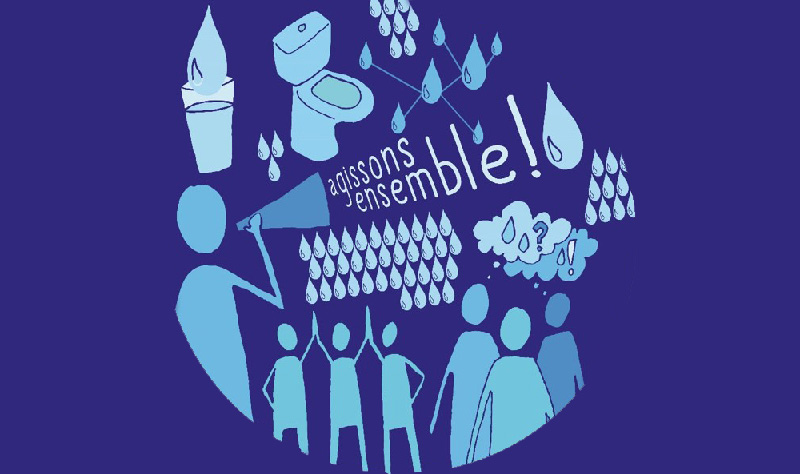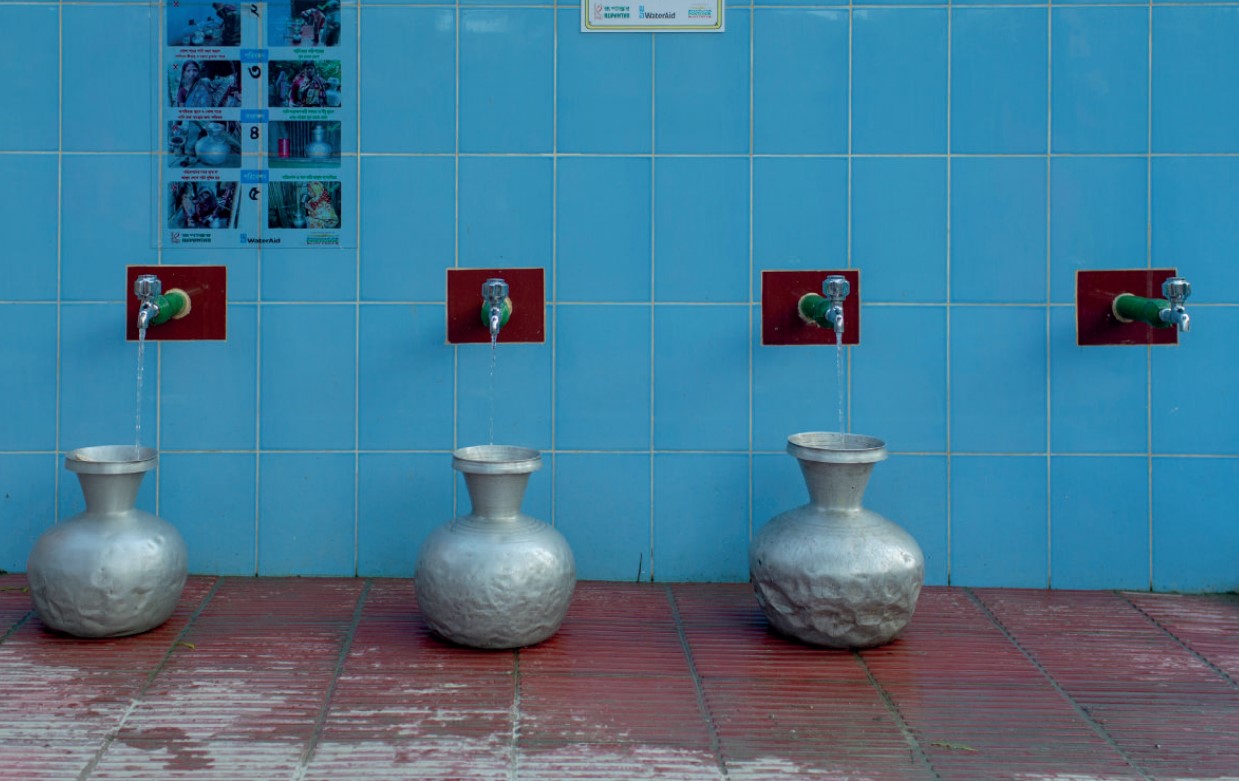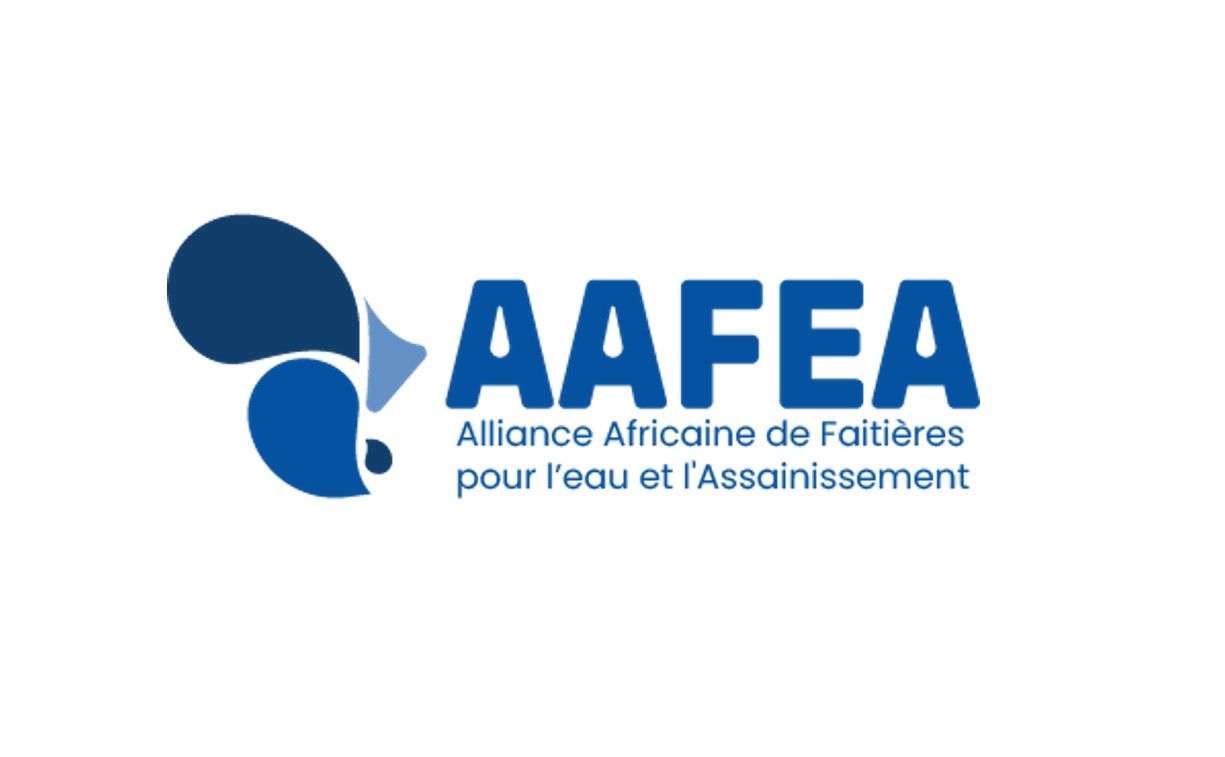À l’approche de la 5ème session de négociations du traité international contre la pollution plastique, prévu le 25 novembre 2024 à Busan (Corée du Sud), la Coalition Eau appelle les négociateurs, aux côtés de plus de 90 associations du monde entier, à :
- soutenir l’accès universel aux services d’eau
- réduire la production mondiale de plastique
- réduire les plastiques à usage unique et tout particulièrement les bouteilles qui sont le deuxième déchet plastique le plus polluant à l’échelle mondiale.
Call to support universal access to water services and to stop plastic bottles expansion
NGOs across the world urge the Global Plastics Treaty negotiators to strongly reduce plastic bottle production and to support universal access to water services.
Distinguished Delegates and Chair of the International Negotiation Committee for a Global Plastics Treaty,
In view of the upcoming fifth round of negotiations on an international legally binding instrument (ILIB) on plastic pollution (INC-5), the civil society organisations signatories to this letter would like to insist on the importance of including strong measures to reduce the production and consumption of plastic bottles and support instead access to safe drinking water for all.
Human health and the human right to safe drinking water for all are threatened by plastic pollution and the expansion of plastic bottled water markets. We call to support universal access to water services and to stop plastic bottles expansion.
Plastic poses an ongoing crisis for human health, due to its pollution and to the increasing hazardous chemicals and microplastics releases exposure, which imply the application of the precautionary approach. The effects on health of chemicals present in plastic products, including bottles, are well documented and there is growing evidence about microplastic presence in critical human organs and bloodstream[1].
Plastic bottles are a main source of human exposure to toxic chemicals[2] and microplastics, leaking from bottle production facilities as well as from the packaging into the water it contains. A study published in January 2024[3] has found an average of 240,000 particles from seven different types of plastic in plastic bottles, mostly in the form of nano plastics.
Moreover, the rapidly-growing bottled water industry (+73% in the past ten years) can undermine progress towards a key sustainable development goal – safe water for all-, as an United Nations University report[4] recently revealed.
The report concludes that unrestricted expansion of the bottled water industry is not aligned strategically with the goal of providing universal access to drinking water, distracting attention and resources from accelerated public water supply systems development. Besides, the report highlights the lack of transparency of the bottled water industry, the growing contamination cases all over the world, and the threat to a sustainable management of groundwater resources. The European Commission also denounced in July 2024 fraud in the natural mineral waters and spring waters sector [5] with potential consequences on human health.
Furthermore, bottled water per litre can cost 150 to 1,000 times more[6] than the price a municipality charges for tap water. Thereby, affordable access to water, which is an essential criterion of the human right to water, is not guaranteed.
We call to support universal access to water services and to stop plastic bottles expansion.
Estimates[7] suggest that less than half of what the world pays for bottled water annually would be sufficient to ensure clean tap water access for hundreds of millions of people without it – for years.
We call for an elimination, or at least a strong reduction, of all kinds of single use plastics, especially plastic bottles, which are a main cause of plastic damages on environment and health
The Plastic Treaty text should absolutely consider plastic bottles as a main problematic and easily avoidable single use plastic product (where possible) regarding :
- the burden of plastic bottles[8] in plastic pollution, and the risks due to the release of microplastics ;
- the fact that plastic bottles are avoidable easily in most areas, as almost 5 billion people already have access to safe drinking water and as 2 billion people should also reach this goal in 2030. Indeed, number six of United Nations Sustainable Development Goals plans to “Ensure availability and sustainable management of water and sanitation for all in 2030.”
We stress that plastic bottles (including cardboard bottles lined with plastic and water sachets) should be eliminated where possible, or strongly reduced, in the section of the treaty speaking of problematic, avoidable, single use plastics and microplastics.
National or local examples of strong plastic bottles reduction and ban policies are increasing (I.e. ban in France in 2040 and reduction of half of the sales in 2030, bans in cities in Canada, Australia and the United States) and should inspire the delegates.
Reduction of plastic bottles, and of all kinds of single use plastics, should be supported by ambitious EPR mechanisms, extended to waste prevention, reduction and reuse.
The waste hierarchy is also a main principle to financial mechanisms and technical support, that could inter connect with funding and support needed for access to water and promotion of tap water.
We need controls on plastic production, which threatens planetary boundaries and climate action
In 2019, plastics generated 1.8 billion metric tonnes of greenhouse gas (GHG) emissions—3.4 percent of global emissions—with 90 percent associated with plastics production and, by 2050, these emissions could quadruple to 15 percent of global emissions[9].
It is imperative that the new instrument is designed not only to protect human health and the environment from plastic pollution but that it is also crafted to keep us on track for a 1.5 °C world. Recent studies have demonstrated that without legally binding measures to freeze and phase-down the production of primary polymers, our best-case scenario is merely a stabilisation of greenhouse gas (GHG) emissions at their current levels. These levels are already undermining the attainment of the Paris Agreement’s 1.5°C goal.
A freeze and phase-down in production to sustainable levels is also a priority to enable effective measures in the rest of the life cycle. Waste management systems are completely overwhelmed despite demand reduction measures and massive investments, and controls in production are needed to enable effective and safer solutions.
As plastic bottles are a main driver of plastic production, a strong reduction of these products will help to cap and reduce global production.
Sincerely,
First signatories :
- Muriel Papin, No Plastic In My Sea, France, Core Member of the global movement Break Break Free From Plastic
- Sandra Métayer, Coalition Eau, France
- Sarah Dousse, International Secretariat for Water – Solidarity Water, Europe and Worldwide
- Antoinette Vermilye and Laurianne Trimoulla, Gallifrey Foundation, Switzerland
- Dianna Cohen, Plastic Pollution Coalition, United States
- Jackie Nuñez, The Last Plastic Straw, USA, Puerto Rico, South America, Caribbean, Europe
- Ibrahim Bechrouri, Ekō, Global
- Lorena Paez Brito, Instituto Mexicano de Desarrollo Humano y Aprovechamiento Sustentable SC IMDESU SC, México
- Ana G. Dewar, Retorna, Global
- Laura Martinez, Sociedad de Historia Natural Niparajá, México
- Axèle Gibert, France Nature Environnement, France
- Magali Payen, On Est Prêt, France
- Aziz Faye, POSCEAS, Sénégal
- Pauline Debrabandere, Zero Waste France, France
- Ana Rocha, Nipe Fagio, Tanzania
- Luc Arnaud, GRET, France
- Julien Lallemand, Association Sillages, Réunion Island (France)
- Samuel Höller, a tip: tap e.V, Germany
- Jules Vagner, Objectif Zéro Plastique, France
- Sarah Ehrlich, Free Tap Water, in Belgium
- Piotr Barczak, Polish Zero Waste Association, Poland
- Olivia Skordi and Sara Mariza, Vryonidi, Friends of the Earth Cyprus, Cyprus
- Valentina Muñoz, Sciaena, Portugal
- Marco Capovilla, Venice Tap Water, Italia
- Lucien Delorme, Hydraulique Sans Frontières, France
- Nathalie Tehio, LDH (Ligue des droits de l’Homme), France
- France Yannick Champain, Ligue des droits de l’Homme Pays Soissonnais, France
- Sarah Ehrlich, Free Tap Water in Belgium, Belgium
- Sophie Lehideux, Kynarou, France
- Irena Burba, Association Green Istria, Croatia
- Ana Marija Mileusnic, Zelena akcija / FoE Croatia, Croatia
- Sofia Ribas Plastic Free Ibiza & Formentera (Alliance), Spain (Balearics)
- Elena Jaume Muelbaier, Fundación Cleanwave, Spain/Balearics
- Vanessa Charlotte, Coordination Eau Ile-de-France, France
- Zoran Lalic, Tatavaka, Croatia
- Marco Musso, European Environmental Bureau, Europe
- Jeroen Dagevos, Plastic Soup Foundation, the Netherlands
- Gilles Bogo, Hydraulique Sans Frontières, France
- Cecilia Bianco, Taller Ecologista, Argentina
- Vanessa Olivares, Universidad Autónoma del Estado de México, México
- Iyari Espinoza, Grupo de investigación de mamiferos marinos, México
- Rosemarie Zehetgruber, Waterschools Vienna, Austria
- Jean-Pierre Mahe et Eric Buchet, Experts Solidaires, France
- Loic Monjour, E.A.S.T, Eau Agriculuture Santé en Milieu Tropical, France
- Gabrielle Kuzak et Eve Warlow, City to Sea, UK
- Chloé Schwizgebel, Fair Resource Foundation, The Netherlands; Belgium
- Margot Clarys et Perrine Benoist , Action Contre la Faim France, France
- Oscar Velez, Revive Mexico, Mexico
- Mayra Victoria Gutiérrez Sandoval, Ponguinguiola, México
- Daniel Aguirre-Ayala, Marine Mammal Research Group (GRIMMA), México
- Francisco Alcocer y Lozano, Los Cabos Coastkeeper: Flora and Fauna Protection Area, México
- Froilan Esquinca Cano, UICN CEM México Focal Point, México
- Mark Johnston, The Scarab Trust, United Kingdom
- Mauricio Cornaglia, Campaña Plurinacional en Defensa del Agua para la Vida, Argentina
- Sylvie Platel, WECF France, France
- Serge Doussant, Green Vientiane, Laos
- Alejandra Parra, Red de Acción por los Derechos Ambientales RADA, Chile
- Maria Eugenia Gil-Beroes, Fundación Aguaclara, Venezuela
- Marisol Landau, Fundación de Acción Social por Panamá FAS, Panama
- Larisa de Orbe, Red Mexicana de Acción Ecológica, México
- Anne-Christelle Beauvois, 1 Déchet Par Jour, France
- Jean-Michel Damiens, eau secours 62, France
- Nathalie Seguin, Redes del Agua, México
- Sofie Van Canegem, Naturvernforbundet, Norway
- Jan Dell, The Last Beach Cleanup, Global
- Frédérique Mongodin, Seas At Risk, Belgium
- Patricia Reina Toresano, Vivir sin plástico, Spain
- Seema Prabhu, Trash Hero World, Global
- György Szabó, Humusz Szövetség, Hungary
- Anne Aittomaki, Plastic Change, Europe
- Katja Sreš, Ekologi brez meja, Slovenija
- Susana Fonseca, ZERO – Association for the Sustainability of the Earth System, Portugal
- Narantuya Gursed, Ecosoum NGO, Mongolia
- Kristine Kubat, Recycle Hawaii, United States of America
- Joanie Steinhaus, Turtle Island Restoration Network, United States of America
- Jossue Ureno, Mi Familia En Accion, United States of America
- Kendra London, Our Afrikan Family Organization, United States of America
- Maya Rommwatt, Defend Our Health, United States of America
- Peggy Bery, Between the Waters, United States of America
- Martin Bourque, Ecology Center, United States of America
- Lea Harper, FreshWater Accountability Project, United States of America
- Dana Winograd, Plastic Free Seas, Hong-Kong – China
- Cecilia Torres, Mingas por el mar, Ecuador
- Marisa Jacott, Colectiva Malditos Plásticos, México
- Rangel Tupa, Save the Med, Mallorca, Balearic Island, Spain
- Elisa Martinez, Marilles Foundation, Spain
- Hatice Benan, BioDer (Biologists Association of North Cyprus), Cyprus
- Antidia Citores, Surfrider, Europe
[1] Plastic and human health, Geneva environment network, 2024
[2] Unpacking the complexity of the PET drink bottles value chain: A chemicals perspective, Science direct, 2022,
[3] Rapid single-particle chemical imaging of nanoplastics by SRS microscopy, PNAS, 2024
[4] Global Bottled Water Industry: A Review of Impacts and Trends, United Nations University, 2023
[5] European Commission Audit on bottled water sector fraud
[6] Datas mentioned by the United nations university Report already cited
[7] United nations university Report already cited
[8] Plastic bottles are a main driver of plastic pollution, Nature Sustainibilty publication, 2021 and Plastic bottles are the items most frequently found in clean ups, Break Free From Plastic Brand audit
[9] Plastic and climate : The hidden costs of a plastic planet






